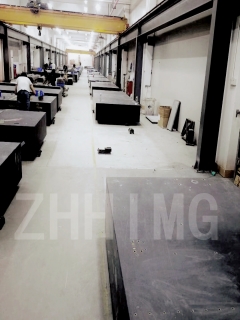When it comes to manufacturing a universal length measuring instrument, the machine bed is a crucial component that plays a vital role in ensuring its accuracy, stability, and robustness. The material used for the machine bed is an essential consideration, and two popular choices available in the market are granite and metal.
Granite has been the preferred choice over metal for machine bed construction for several reasons. In this article, we will explore some of the reasons why granite is an excellent choice over metal for a universal length measuring instrument.
Stability and Rigidity
Granite is a dense and naturally occurring material that exhibits high stability and rigidity. It is three times denser than steel, making it much less prone to vibrations and distortions caused by thermal fluctuations, pressure, or external factors. The stability and rigidity of granite ensure that the measuring instrument remains stable and accurate, reducing the errors caused by external factors.
Thermal Stability
One critical factor that affects accuracy and precision in length measuring instruments is thermal expansion. Both metal and granite materials expand and contract with fluctuating temperatures. However, granite has a much lower coefficient of thermal expansion than metals, which ensures that the machine bed remains dimensionally stable despite temperature changes.
Resistance to Wear and Tear
The machine bed in a universal length measuring instrument needs to withstand the test of time. It should be durable and resistant to wear and tear due to the continuous movement of the measuring probes and other mechanical components. Granite is renowned for its hardness and durability characteristics, making it an ideal material for the machine bed.
Smooth Surface Finish
The surface finish of the machine bed is crucial in ensuring that there is no slippage, and the measuring probe's movement remains smooth and uninterrupted. Metal has a higher coefficient of friction than granite, making it less smooth and increasing the possibility of slippage. Granite, on the other hand, has a much higher smoothness factor and is less prone to slippage, providing greater precision and accuracy in length measurement.
Ease of Maintenance
Maintenance is an essential aspect of any machine's longevity and accuracy. In the case of a universal length measuring instrument, granite machine beds require less maintenance than metal beds. Granite is a non-porous material, meaning that it is impervious to liquids and chemicals that could cause damage. Metal, on the other hand, requires more frequent inspections and cleaning to prevent rust and corrosion.
In conclusion, for a universal length measuring instrument, a granite machine bed is an outstanding choice over metal for the reasons mentioned above. Granite provides superior stability, rigidity, thermal stability, resistance to wear and tear, smooth surface finish, and ease of maintenance, ensuring that the instrument remains accurate and precise in the long run.
Post time: Jan-12-2024

